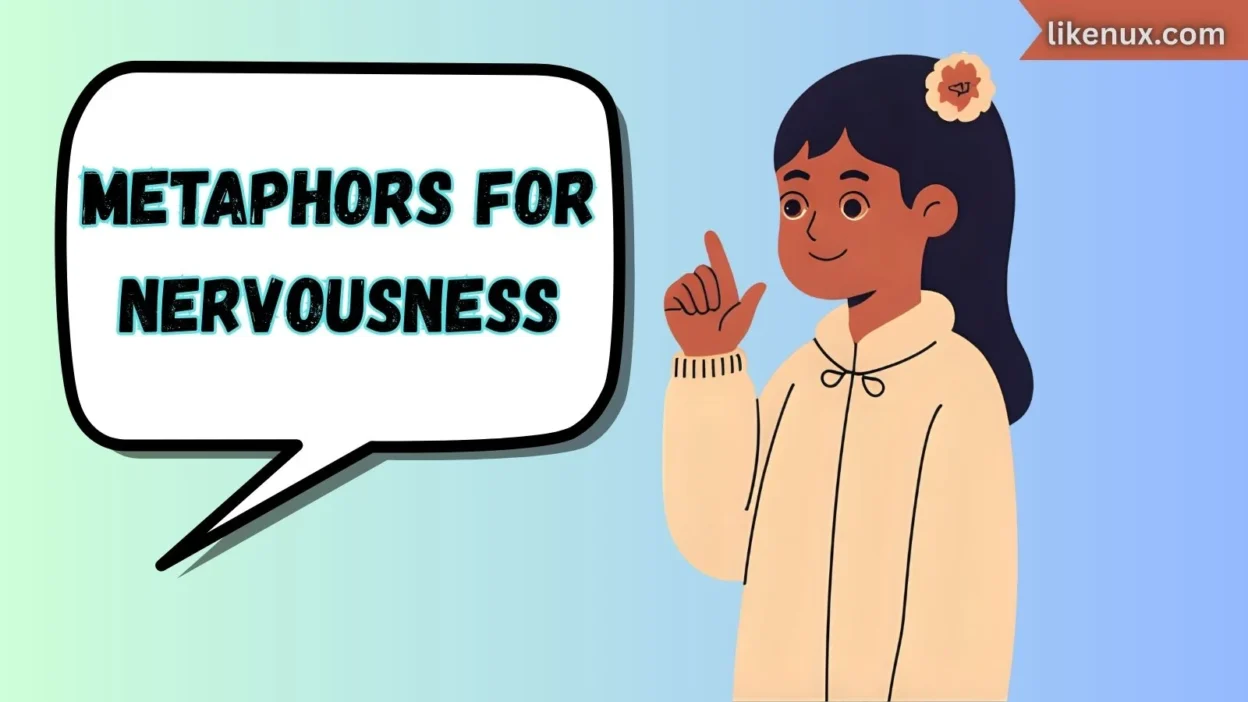Feeling nervous is something we all go through whether it’s before a big exam, a job interview, or even meeting someone new. Nervousness can be described in countless ways, and sometimes, finding the right metaphor makes it easier to explain what’s happening inside. In this article, I’ll share 25 metaphors for nervousness that are both vivid and relatable. These expressions not only help you communicate better but also allow you to connect with others who have felt the same way.
I’ve personally felt my heart race before speaking in front of a crowd, and sometimes it felt like a storm was inside me. That’s why I believe using metaphors can add a touch of warmth and humanity when we talk about our feelings.
1. A Storm Brewing Inside
- Meaning: Nervousness feels like dark clouds and thunder gathering in your chest.
- Sentence: “Before stepping onto the stage, I felt a storm brewing inside.”
- Best Use: Ideal when describing anxiety before a big event.
- Other Ways to Say: “Inner chaos,” “emotional thunder,” “a whirlwind of nerves.”
Read More: Metaphors for New
2. Butterflies in the Stomach
- Meaning: A fluttering sensation in the belly caused by nervous energy.
- Sentence: “She had butterflies in her stomach before her first date.”
- Best Use: Perfect for lighter, more positive nervousness.
- Other Ways to Say: “Stomach flutter,” “tickling nerves,” “gentle unease.”
3. Walking on Thin Ice
- Meaning: Feeling nervous as if one wrong move could break everything.
- Sentence: “He felt like he was walking on thin ice during the interview.”
- Best Use: Useful when describing tension in uncertain situations.
- Other Ways to Say: “On edge,” “unstable ground,” “living on the edge.”
4. Heart Racing Like a Drum
- Meaning: The heartbeat feels fast and loud, almost like drumbeats.
- Sentence: “Her heart was racing like a drum before she spoke.”
- Best Use: Great for moments of public speaking or anticipation.
- Other Ways to Say: “Heart pounding,” “racing pulse,” “beating fast.”
5. A Knot in the Stomach
- Meaning: Nervousness feels like your stomach is twisted up.
- Sentence: “He had a knot in his stomach before the exam.”
- Best Use: Best for describing physical tension caused by nerves.
- Other Ways to Say: “Tight belly,” “stomach in twists,” “gut tension.”
6. Standing on Shaky Ground
- Meaning: Nervousness makes you feel unsteady and insecure.
- Sentence: “She was standing on shaky ground as she gave her answer.”
- Best Use: Helpful for describing fear of uncertainty.
- Other Ways to Say: “Unstable footing,” “on wobbly legs,” “insecure ground.”
7. A Fire in the Chest
- Meaning: Nervous energy burns inside like uncontrollable flames.
- Sentence: “He felt a fire in his chest before making his announcement.”
- Best Use: Expresses intensity of nervousness.
- Other Ways to Say: “Burning inside,” “inner flames,” “fiery nerves.”
8. Shaking Like a Leaf
- Meaning: Nervousness causes trembling and shaking.
- Sentence: “She was shaking like a leaf before her speech.”
- Best Use: Ideal for showing visible signs of nervousness.
- Other Ways to Say: “Trembling,” “quivering,” “shivering with nerves.”
9. Trapped in a Cage of Worry
- Meaning: Nervousness makes you feel stuck and helpless.
- Sentence: “He felt trapped in a cage of worry before the results came out.”
- Best Use: Good for describing mental stress and helplessness.
- Other Ways to Say: “Locked in anxiety,” “mental cage,” “confined by fear.”
10. Like Walking into a Spotlight
- Meaning: Nervousness comes from feeling exposed.
- Sentence: “She felt like walking into a spotlight during her presentation.”
- Best Use: Perfect for stage fright or public speaking.
- Other Ways to Say: “All eyes on me,” “center of attention,” “under scrutiny.”
11. Waves Crashing in the Mind
- Meaning: Nervousness feels like restless waves inside your head.
- Sentence: “He felt waves crashing in his mind before the meeting.”
- Best Use: Describes mental chaos.
- Other Ways to Say: “Mental storm,” “rushing thoughts,” “mind in turmoil.”
12. Balancing on a Tightrope
- Meaning: Nervousness makes you feel fragile and cautious.
- Sentence: “She felt like balancing on a tightrope during the negotiation.”
- Best Use: Expresses fear of making mistakes.
- Other Ways to Say: “Walking a fine line,” “fragile balance,” “risky step.”
13. A Volcano Ready to Erupt
- Meaning: Nervous energy builds up like molten lava inside.
- Sentence: “His nerves felt like a volcano ready to erupt.”
- Best Use: Strong emotional intensity.
- Other Ways to Say: “Inner eruption,” “pent-up nerves,” “boiling inside.”
14. Cold Sweat Running Down
- Meaning: Nervousness causes sudden sweating.
- Sentence: “He broke into a cold sweat before the exam started.”
- Best Use: For physical signs of nervousness.
- Other Ways to Say: “Sweaty palms,” “clammy skin,” “damp with fear.”
15. Mind Racing Like a Car
- Meaning: Nervous thoughts speed uncontrollably.
- Sentence: “Her mind was racing like a car before the big test.”
- Best Use: Mental overthinking moments.
- Other Ways to Say: “Fast thoughts,” “speeding brain,” “mental rush.”
16. Standing at the Edge of a Cliff
- Meaning: Nervousness feels risky, like one step could change everything.
- Sentence: “He felt like standing at the edge of a cliff before the decision.”
- Best Use: Big life-changing decisions.
- Other Ways to Say: “On the brink,” “at a turning point,” “life at stake.”
17. A Churning Ocean Inside
- Meaning: Nervousness feels like stormy waves inside.
- Sentence: “She had a churning ocean inside before her performance.”
- Best Use: Emotional turbulence.
- Other Ways to Say: “Restless waves,” “inner tide,” “emotional storm.”
18. Frozen Like a Statue
- Meaning: Nervousness makes you unable to move.
- Sentence: “He stood frozen like a statue when his name was called.”
- Best Use: Perfect for stage fright.
- Other Ways to Say: “Paralyzed with fear,” “unable to move,” “still with nerves.”
19. Carrying a Heavy Backpack of Worry
- Meaning: Nervousness feels like a heavy load on your back.
- Sentence: “She carried a heavy backpack of worry into the exam hall.”
- Best Use: Long-term stress or pressure.
- Other Ways to Say: “Burden of anxiety,” “mental load,” “weight of nerves.”
20. Like Ants Crawling Under the Skin
- Meaning: Nervousness makes the body restless.
- Sentence: “He felt like ants crawling under his skin before the surgery.”
- Best Use: Describes unease and restlessness.
- Other Ways to Say: “Itchy nerves,” “unsettling feeling,” “skin crawling.”
21. Lost in a Fog of Fear
- Meaning: Nervousness clouds your thoughts like thick fog.
- Sentence: “She was lost in a fog of fear during the meeting.”
- Best Use: Describes mental confusion.
- Other Ways to Say: “Brain fog,” “unclear thoughts,” “mind clouded.”
22. Like Holding a Fragile Glass
- Meaning: Nervousness feels delicate and breakable.
- Sentence: “He felt like holding a fragile glass when he spoke up.”
- Best Use: Situations requiring care and caution.
- Other Ways to Say: “Delicate moment,” “easily breakable,” “fragile nerves.”
23. Ticking Time Bomb Inside
- Meaning: Nervousness builds up pressure like an explosion waiting.
- Sentence: “Her nerves felt like a ticking time bomb before the speech.”
- Best Use: Extreme nervousness and tension.
- Other Ways to Say: “Ready to burst,” “explosive nerves,” “emotional bomb.”
24. Like a Deer Caught in Headlights
- Meaning: Nervousness leaves you frozen under pressure.
- Sentence: “He stood like a deer caught in headlights when asked a question.”
- Best Use: Useful for describing shock or sudden nerves.
- Other Ways to Say: “Paralyzed with fear,” “frozen in place,” “caught off guard.”
25. A Rollercoaster of Emotions
- Meaning: Nervousness feels like going up and down emotionally.
- Sentence: “She was on a rollercoaster of emotions before the results.”
- Best Use: When describing shifting nerves and excitement.
- Other Ways to Say: “Emotional ups and downs,” “waves of feelings,” “inner ride.”
FAQs about Nervousness
1. Why do we feel nervousness before important events?
Because our body responds with adrenaline, preparing us to face challenges.
2. Are metaphors helpful for describing nervousness?
Yes, they make emotions easier to communicate and relatable to others.
3. What are some physical signs of nervousness?
Sweaty palms, rapid heartbeat, trembling, and an upset stomach.
4. How can I manage nervousness effectively?
Deep breathing, preparation, positive self-talk, and relaxation techniques help.
5. Is nervousness always negative?
Not always—it can also mean you care deeply and want to do well.
Conclusion
Nervousness is a universal human experience. Whether it feels like butterflies in the stomach, waves crashing in the mind, or even a storm brewing inside, using metaphors makes it easier to share what’s going on inside us. By describing our feelings in creative ways, we not only express ourselves better but also help others feel less alone in their own struggles.
If you’ve ever been nervous, remember—it’s just a sign that you’re human, and you care. And sometimes, finding the right words can make all the difference.

Andrew Christopher is a passionate visionary who blends creativity with purpose to bring ideas to life. With a focus on innovation and integrity, he inspires growth and lasting impact.



